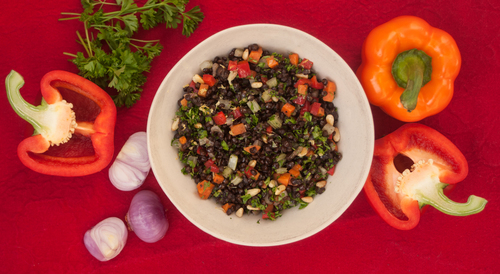Super Speedy Spring Soup with Asparagus & Spinach
Serves 4
Ingredients
1 tbsp olive oil
1 tbsp butter (optional, can just use oil)
3 shallots, peeled and finely diced
2 garlic cloves, peeled and crushed
400g asparagus, tips reserved, stalks chopped into 1 cm pieces, very woody ends can be used for stock
2 large handfuls of spinach (or watercress for a more peppery-flavoured soup)
750ml vegetable stock
Handful of (toasted) pumpkin seeds (optional)
½ - 1 mild red chilli, finely chopped (optional)
Method
Heat the butter (if using) and olive oil in a saucepan and fry the asparagus tips for a few minutes until bright green and softened, then remove from pan and set aside.
Add shallots, garlic and asparagus stalks to the pan, cover, and cook for 5-7 minutes, stirring periodically, until softened.
Add spinach (or watercress for a more peppery-flavoured soup) and stock, bring to the boil. Use a hand blender to whizz up or transfer to a liquidizer.
Serve in bowls with the asparagus tips, toasted pumpkin seeds and chilli (if using) scattered over. Delicious as it is, or served with fresh sourdough bread.
Asparagus season is here!
Nowadays you can buy asparagus in the supermarket all year round but imported asparagus isn’t great for our carbon footprint and I think asparagus grown here in Britain is simply more delicious – so make the most of its short season (May – July).
Nutritional Information About Asparagus
Asparagus is nutritionally dense and provides important nutrients such as beta-carotene, vitamin C, vitamin E, vitamin K, vitamins B6, B2, B3 and folic acid, iron, calcium, magnesium, zinc, selenium, chromium, potassium and is very low in sodium.
Asparagus is also rich in anti-oxidants and has powerful anti-inflammatory properties thanks to nutrients such as saponins (including asparanin A, sarsasapogenin, protodioscin and diosgenin – good luck pronouncing those!) and flavonoids like quercetin and rutin making it a fabulous addition to your diet. Asparagus is very fibre-dense and contains plenty of inulin, a prebiotic which feeds our friendly gut bacteria.
NB asparagus contains naturally-occurring purines which may cause problems for some individuals susceptible to gout or kidney stones. These individuals are advised to limit their intake of purine-rich foods like asparagus.
Other Ideas for Using Asparagus
Asparagus is very versatile and can be eaten in many ways:
Steamed – try with a drizzle of olive oil and lemon zest
Griddled or dry roasted in a frying pan, which gives it a lovely nutty flavour – serve with a smidge of butter, lemon and salt or add the dry roasted spears to a quinoa salad, with some toasted pine nuts or pumpkin seeds and bitter leaves like rocket.
Roasted with other veg in the oven; onions, peppers, garlic and chilli are good roasting partners
Raw in a salad
As soup
Added to Risotto
Turned into a dip
Asparagus and Eggs
A lovely breakfast or light lunch
I think asparagus and eggs make a lovely partnership - add to an omelette, frittata or quiche, serve with softly poached eggs or instead of toast soldiers dipped in a soft boiled egg – delicious!
‘Asparagus Wee’
Ever noticed your wee smells rather strange after eating asparagus? Well some of us do and some of us don’t. Scientists have been trying to figure out what exactly causes this smelly effect and there have been different theories put forward over the years. It is thought that the odour is due to an excreted sulphur-containing compound called methanethiol. However scientists are not sure whether foul-smelling ‘asparagus wee’ is due to the ability to produce methanethiol or the ability to smell it. There have even been some family-based studies that suggest there is a genetic variant responsible for the ability to smell the odour or not. Until more research is done we won’t be sure but that doesn’t stop us enjoying eating asparagus!






